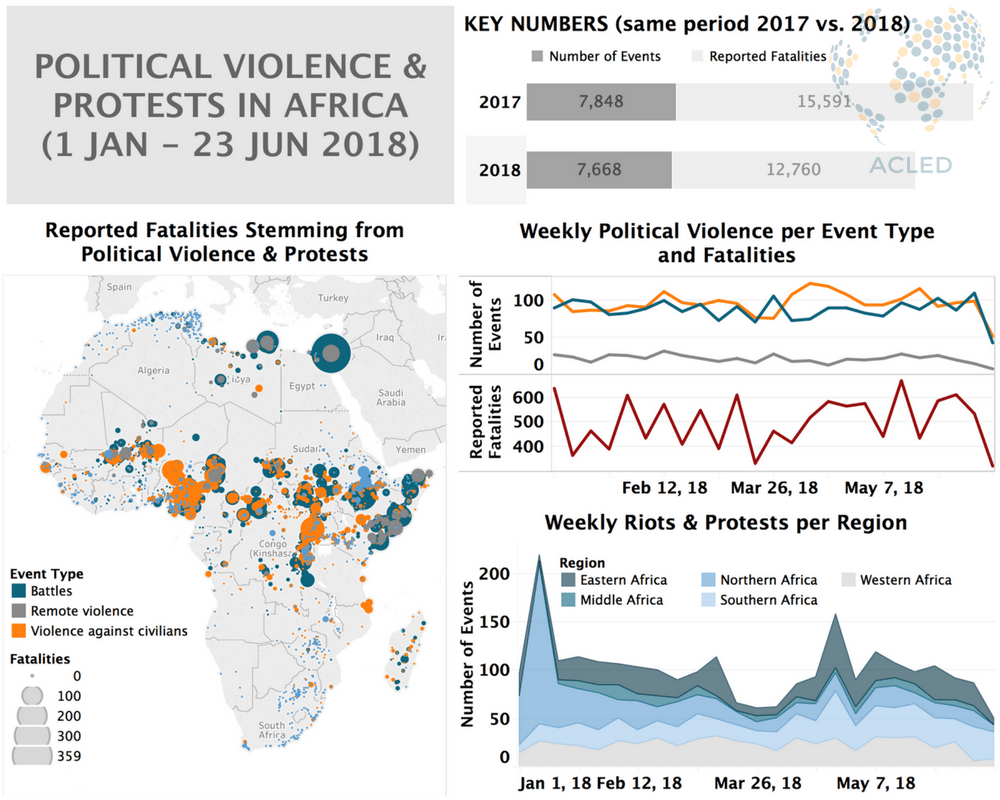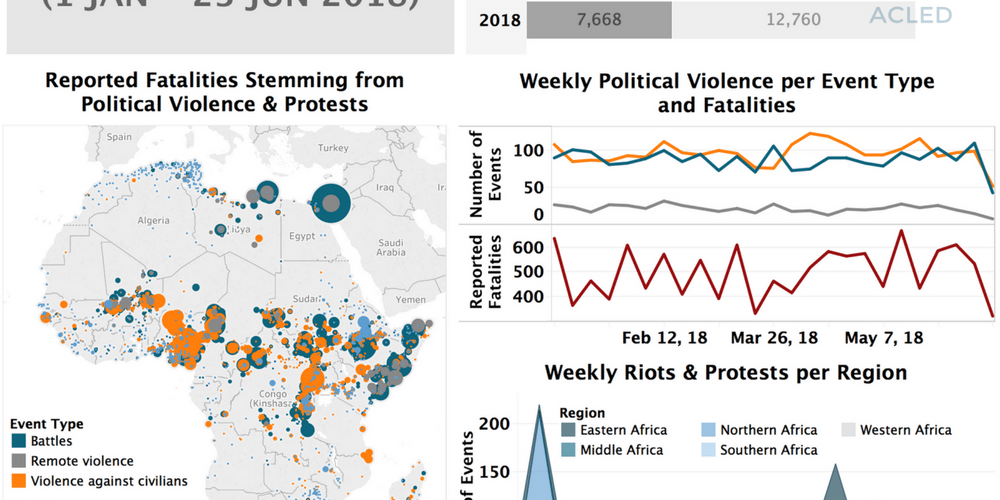There were several critical developments in Africa in the week of June 17th.
Key among them were the two small bomb attacks on the leaders of Ethiopia and Zimbabwe on June 23rd at political rallies in Addis Ababa and Bulawayo, respectively. The explosions left two people killed in both Ethiopia and in Zimbabwe. Several key senior ruling officials and ministers were also injured in Zimbabwe, though the leaders of both countries escaped unhurt. The attacks came amidst rising ethnic violence in Ethiopia and rumors that groups are seeking to discredit the new administration. In Zimbabwe, the incident is likely to provoke a heavy crackdown and to further heighten tensions within the ruling party ahead of the July 30th presidential elections. The bombing is strongly suspected to have been an intra-regime plan.
Government representatives were also targeted in other countries. In South Africa, an African National Congress member of Parliament was shot dead in Roodepoort in Johannesburg on June 19th. In Tanzania, the Executive Secretary of the National Examinations Council was nearly lynched by a mob after his car killed a motorcyclist in Tabora.
Another key trend on the week of June 17th was the high levels of violence in Nigeria. Boko Haram activity was high around Maiduguri in Borno state: a bombing was carried out by six child suicide attackers at an Eid festival in Damboa, south of Maiduguri, on June 16th. Boko Haram militants threw grenades at the gathering crowd after the explosion. At least 43 people were killed in total. Boko Haram suicide bombers also detonated later that week at the edge of a military barrack in Maiduguri and at Tungushe village, causing further casualties. On June 22nd, the Nigerian forces supported by the Civilian Joint Task Force responded to these events by launching a clearing operation in the Mafa area, around 50km east of Maiduguri. Elsewhere in Nigeria, attacks on communities related to the Middle Belt conflicts continued resulting in dozens of deaths. And protests by the Islamic Movement turned violent in Kaduna when their leader was arraigned before the state’s High Court on June 21st, leaving one policeman killed. Clearly, President Buhari faces important challenges ahead of the 2019 elections.
Meanwhile, the Democratic Republic of Congo (DRC), Cameroon and Mali remained hotbeds of violence, while Rwanda saw a rare attack by gunmen along the border with Burundi. In the DRC’s Walikale territory, inter-Mayi Mayi tensions are running high following the death of Shario Ngendo, who was the leader of a splinting faction of the Nyatura led by Delphin Mbaenda. Clashes between the two groups occurred on June 10-11th. In Cameroon’s Anglophone regions, violence targeting security forces as well as civilians has become endemic, as the security forces fight Ambazonian separatists village by village. In Mali’s Mopti region, reports of mass atrocities carried out by the government forces continue as two new mass graves were uncovered on June 13th and 19th. In parallel, violence by Dozo militants on the Fulani community has become a daily occurrence since May. The Dozos have faced increasing resistance from the Alliance for the Salvation of the Sahel, an armed self-defense group formed late May in the areas of Koro, Djenne and Douentza to protect the Fulani community. Violence against Fulani civilians continues, however: most recently, on June 23rd, at least 32 were killed in an attack on Koumaga village. Finally, in Rwanda, a rare attack occurred as gunmen coming from the Nyungwe forest (along the border with Burundi) killed two and shot another three in a village in Nyaruguru district, Southern province.
In South Sudan, a meeting in Addis Ababa between President Salva Kiir and rebel Sudanese People’s Liberation Army/Movement-In Opposition (SPLA-IO) leader, Riek Machar inspired no hope for peace, as usual. It was the first time the two leaders met since the July 2016 Juba violence and the ensuing spread of the SPLA-IO insurgency. The meeting followed competing efforts by Sudan, Kenya, and Ethiopia to broker an accommodation between the leaders, though little substantive progress was reported. Fighting between the two parties appears to have reduced in much of the country since the start of June.
Finally, riots and protests continued in a number of countries. In Algeria, doctors of the Autonomous Medical Residents Collective (CAMRA) have been striking for the past eight months. They protested on June 17th in several regions after 800 of their colleagues were fired for striking. Berber populations have also been protesting across several regions since end May to call for a review of the prison sentence given to Berber journalist Merzoug Touati, accused of having sought to destabilise Algeria’s diplomatic position through interactions with Israel. The protesters believe he was imprisoned because of his Berber origins. Touati’s sentence was reviewed from 10 to seven years on June 21st. In Sudan, people protested for seven consecutive days over water and electricity outages, mainly in Port Sudan but also in El Obeid and New Amri. In South Africa, riots and protests have intensified over the past few months over service delivery issues. Last week, on World Refugee Day, protests also took place to highlight the fact that South Africa is one of the largest receivers of refugees and asylum seekers in the world. Finally, in Gambia, protests against the mining of sand, which is badly polluting rice farms, turned violent, and left three people killed and over 20 injured. The inspector general of the national police resigned after the incident, highlighting fears over the reviving of Gambia’s authoritative past.

AfricaAnalysisCivilians At RiskCurrent HotspotsRemote ViolenceRioting And ProtestsViolence Against Civilians






